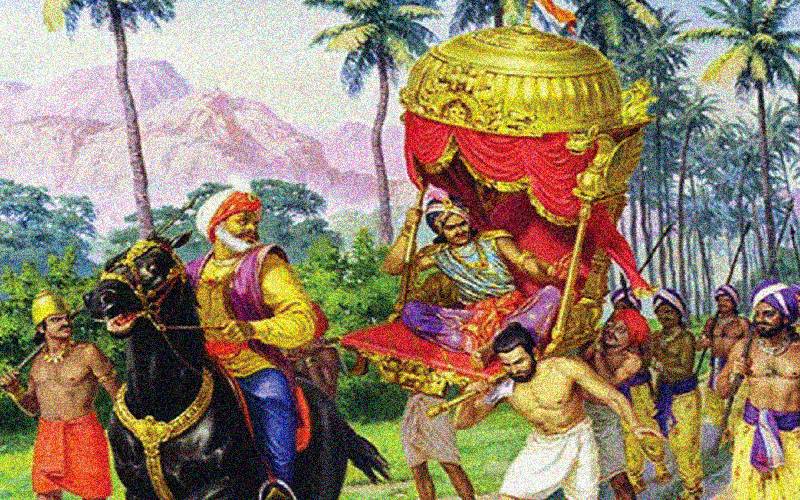
‘Jada Bharatha Charitra’ is part of the ‘Bhaagavata Puraana.’ Narayana Bhattathri of Kerala composed the ‘Narayaneeyam’ and it was also based on the ‘Bhaagavata Puraana.’ But he did not include the story of Jada Bharatha. The famous pravachana kartha, Sengalipuram Anantarama Deekshithar, used to wonder why this was left out. He spoke to many people about this not being part of the sacred ‘Narayaneeyam.’ All these enquiries just hit the wall and Deekshithar decided to compose the ‘Jada Bharatha Charitra’ at the Sri Krishna Temple in Guruvayoor.
The devout Deekshithar gathered himself at Guruvayoor and many of his disciples joined him. He composed and submitted the ‘Jada Bharatha Charitra’ in front of Lord Guruvayoor Appan and everyone present there, experienced horripilation. Anantarama Deekshithar had tears of joy on learning that Lord Guruvayoor Appan had accepted his submission. A portrait of Anantarama Deekshithar continues to decorate the temple at Guruvayoor.
Who is this Jada Bharatha and why is he so important?
Let us understand the background before proceeding further. Bharatha was the son of Dushyantha (Rishabhadeva) and Shakunthala. He was born of Poorna garbha (Complete womb time), for he stayed in his mother’s womb for 36 months. The Super-strong Bharatha would play with forest animals during his childhood years. Mischievous lions and tigers would get beaten up by him if they tried to act in a funny way.
Bharatha was brought up as per Kshatriya dharma by his father and he turned out to be a noble ruler. He ruled the huge landmass called Anjanaabha Varsha and this was to later become famous as Bhaaratha Varsha. Even today, the land is called Bhaaratha meaning the land of Bharatha. The great ruler had five sons from Panchajani (Daughter of Vishwaroopa), Sumathi, Raashtrabhootha, Sudharshana, Aavarana, and Dhoomrakethu. Bharatha fulfilled his duties and was wanting to go to the forest and meditate. This was for the purpose of attaining Moksha (Liberation) and therefore he transferred all his duties to his children.
Jada Bharatha soared due to his meditation and his level of realization kept getting better and better. He was attaining several higher stages in meditation and thus his old age was spent in search of the ultimate knowledge.
The great soul used to meditate peacefully on the banks of River Chakra every day. He would do so after chanting the Pranava mantra (Om) and the Gayathri mantra. Life was going on well until the day when Jada Bharatha happened to see a pregnant doe getting terrified on hearing the roar of a lion. The frightened doe tried to run, and it jumped over the river from the top of the rock. The pregnant doe gave birth to a baby while it was on its mid-flight. While the baby doe fell into the river, the mother doe hit a rock on the other side and died.
On seeing the baby doe being carried by the river current, the compassionate Bharatha ran and saved it. He began to look after the doe with utmost care and this made him get the best of milk and the sweetest of delicate grass for it. The doe considered him to be his mother and its presence brought great joy for Bharatha. This attention made him stray from his spiritual practices. The doe would often disturb him and Bharatha would get angry, but his kind heart would soften, and he would begin to play with it. This great ruler had left his kingdom, sons, and wives, to pursue a spiritual path but destiny had changed his way of life in the forest.
Bharatha was at the end of his life and one day he could not find his doe. He cried and the aged body could not bear this grief. Finally, he died thinking of the doe. His attachment towards the doe resulted in his rebirth in the womb of a doe. The young doe who was none other than Bharatha realized that he had committed a mistake by entertaining attachments. This made him sit near the hermitages of sages and would listen to them sing chants and hymns. The calm and the spiritual vibrations kept him happy. Bharatha could harvest all this in spite of being trapped in the body of a doe. He passed away and took birth in the womb of a Brahmin woman. He was born as the second child of the second wife of a scholar.
Bharatha understood that his past attractions had led him astray and this made him take a non-conformist path in spite of the knowing the mantra-s well. Bharatha would stupidly mispronounce them, and he would perform the rituals taught by his father in reverse. The father loved Jada Bharatha (Dull Bharatha) and was worried about his future.
His parents passed away and his family began to ill-treat him. Jada Bharatha had to beg for food, and he was made to look after the family fields. Hunger did not bother him. One day, the assistants of a king were looking for a suitable human who could be sacrificed. This was being done for ensuring that the king would have a male progeny. Jada Bharatha was found suitable, and they bathed him with exotic oils, put perfumes and garlands around him. They made him sit at the feet of Kali and the priest lifted up the axe to chop his head. On seeing this horrible scene, Goddess Kali came out of the statue with all her weapons, and she slashed everyone in the room and went back into the statue.
The young Jada Bharatha became free, and he walked out of the palace. A gang of men found him, and they made him one of the palanquin bearers of King Rahugana (Ruler of Sindhu, and Sauvira). The quiet Bharatha became a palanquin bearer for the king and one day a small worm came on his path. Jada Bharatha stretched his step, and the worm was saved but the palanquin shook badly. He received a piece of the king’s mind but did not feel threatened. Jada Bharatha continued with his job and another worm came in the way. He stepped over it and the king sarcastically said, “You poor fellow, you must be tired, but your co-carriers are not.
The palanquin shook again, and the king became very angry and told Jada Bharatha that he will teach him a lesson. The wise soul began to communicate by stating that the King did not deserve to rule if he was not compassionate. He also stated that pride came in the way of his knowledge.
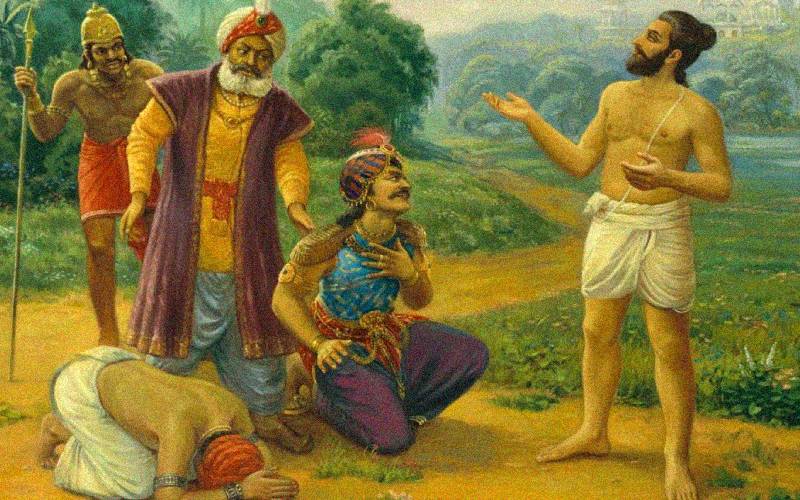
This shocked the king and he wanted to know who Jada Bharatha was and was astonished to learn that the palanquin bearer was in fact his ancestor during his previous birth and that he had no purpose in life except the realization of the final truth. The king beseeched Jada Bharatha to teach everyone in the palace and the sacred soul went over in order to teach some basics of spirituality to everyone in the palace and went away. Finally, Jada Bharatha left his body and thereafter he was freed from the bondage of birth.
In fact, the king had called Jada Bharatha a fool, an old man, etc., and Jada Bharatha began to talk. He wanted to know who was the fool, who wanted to lay down the palanquin, who was tired and who was addressing whom? Jada Bharatha told the king that every mass of flesh was similar, and he also said the self was never tired or never week. He further spoke eloquently about the nature of the soul and about the highest form of knowledge. Jada Bharatha stated that his mind was same as that of the king and that the word ‘you’ is applied to the self. Therefore, the self which could not be weary or tired can never get hurt. He told the king that this body did not want to trample upon the poor worms crawling on the road and therefore he had to move in a kind manner. This had resulted in the uneven movement of the palanquin.
Jada Bharatha stated that it was only his body which was carrying the palanquin and not the soul. The king was made to understand that the moving body was carrying the unmoving spirit within.
Terms like thin and fat, old and young, were used with reference to 5 gross elements and not in relation to the soul. With regard to obeying the orders of a master, Jada Bharatha stated that it was possible only if the servant-master relation is fixed, and not like the current one, for the king may lose his position anytime.
The discourse continued, “Concepts like strong and weak, anger, aversion, grief, joy applies to people who identify themselves with the body. Our souls are what we really are. The mind is but a bundle of thoughts and since the body is inert, it cannot perceive. It will grow and perish one day but the atma will exist forever. A person becomes liberated when he cuts himself away from all forms of attachments. This is only possible by means of wisdom and the company of great souls. One has to praise Lord Narayana at all times. The body gets transformed at all times and anything that gets transformed has a beginning and an end. The wise one should always look out for something that is eternal and unchangeable.”
In fact, King Rahugana was on his way to seek wisdom from Sage Kapila, and he was happy to meet Jada Bharatha on the way. He understood that ego prevented him from knowing the truth and also that the body was just a medium. Rahugana realized that the sword of knowledge and bhakthi would help one overcome various influences which came in the way of attaining liberation.
The story of Jada Bharatha would help one to understand the truth and repeated reading of the same would make one the finest.
NEXT ARTICLE
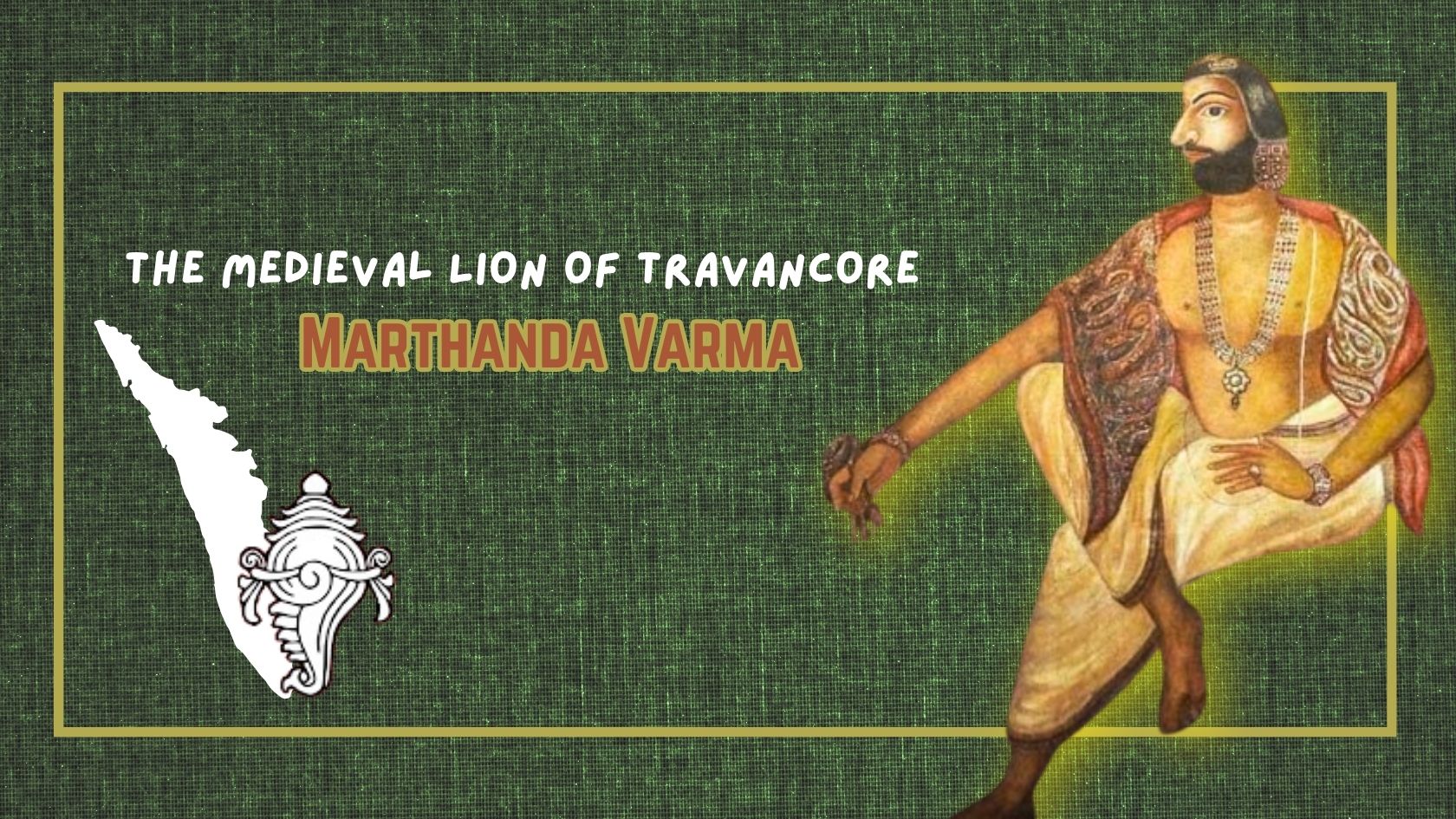
Shri Ramachandra Prasad's captivating narrative and the hot chai that was served at the right time transported me to ancient Kerala, where the extraor...
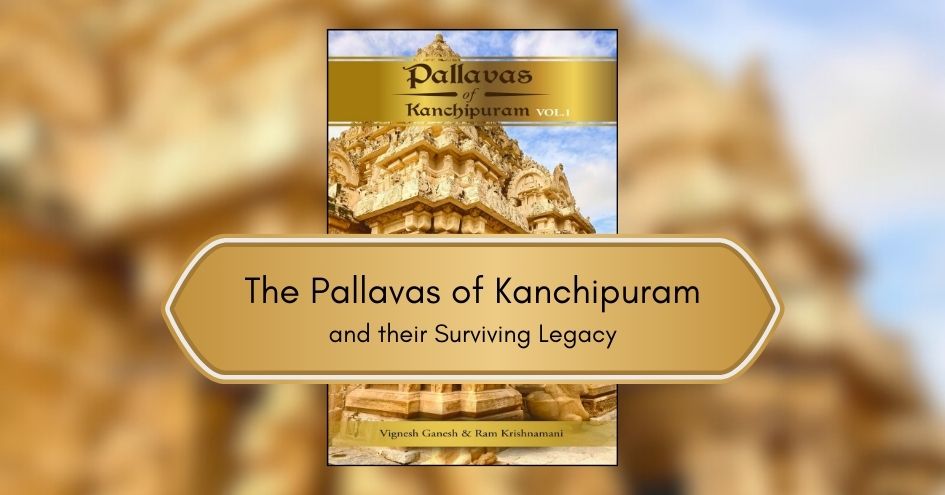
Introduction In Bharatvarsha, History is not the account narrated by victors. It is the record left behind by survivors. The study of Indian History...
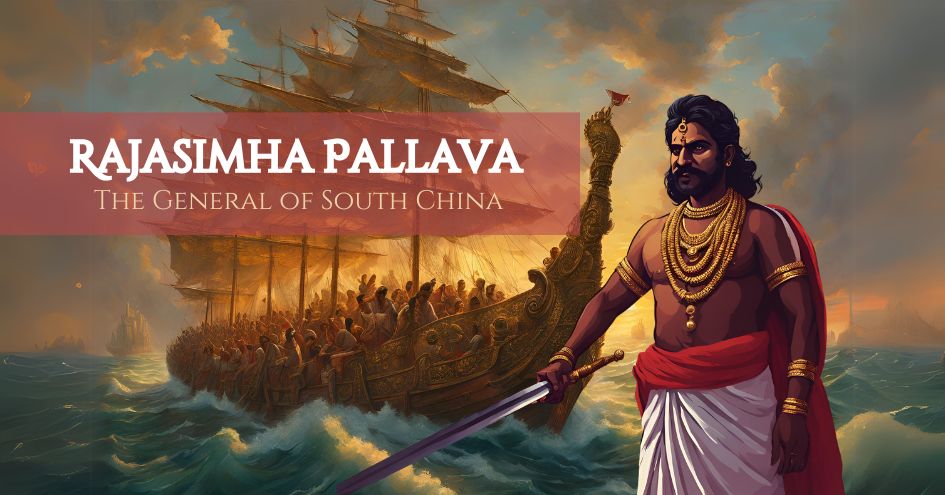
It is the first-half of the 8th Century C.E. in South India. The Pallava kingdom possesses strength and prosperity with some of the greatest monument...